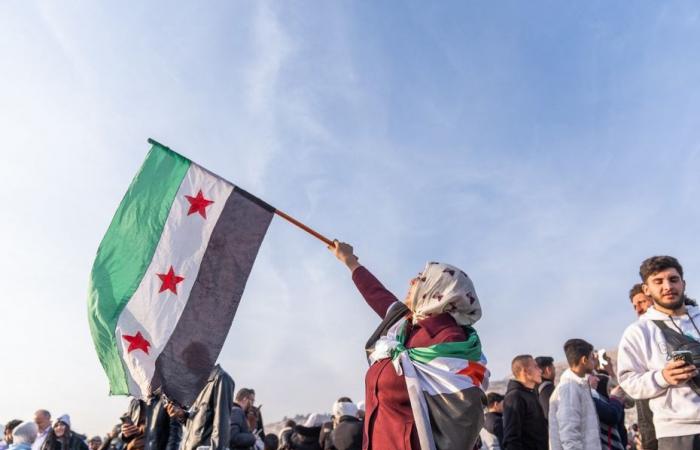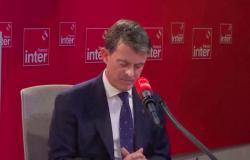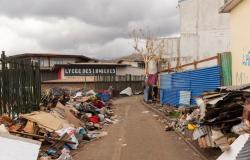Written by Elisabeth Khanchali
The regime of Bashar Al-Assad fell in Syria on Sunday December 8, 2024, after the offensive by the HTC Islamist rebels. Mohammed and Salam, Syrian refugees in Doubs, bear witness to the years of bloody repression in their country.
Company
From daily life to major issues, discover the subjects that make up local society, such as justice, education, health and family.
France Télévisions uses your email address to send you the “Society” newsletter. You can unsubscribe at any time via the link at the bottom of this newsletter. Our privacy policy
“It represents the dream of my life. I have been an opponent for 54 years, since 1970,” book Mohammed about the fall of Syrian dictator Bashar al-Assad on Sunday December 8, 2024. This 71-year-old political refugee currently lives in Doubs with his wife and two children.
Last weekend, President al-Assad fled Syria for Moscow, driven out by a lightning rebel offensive led by the HTC Islamists. This episode puts an end to half a century of rule by the al-Assad clan.
For many refugees, the name of Bashar al-Assad, who ruled Syria for 24 years, embodies years of bloody repression. The civil war, which broke out in 2011 following protests inspired by the Arab Spring, caused nearly half a million deaths and forced millions into exile.
READ ALSO: “Returning to the new Syria, of course yes”: the tears of Shehada, Syrian refugee and cheese maker
Imprisoned for 18 years in Syria, Mohammed suffered torture in several Syrian prisons for his ideas: “I was against this very tyrannical, despotic regime. I only asked for basic freedoms, political rights to work freely, democratic elections”. Mohammed was arrested by Syrian forces because he worked with a secular democratic party.
The sentence following my judgment was 15 years of imprisonment. But they kept me for three more years and I don't know why.
Mohammed, Syrian political refugee
Saidnaya Prison was the last prison where Mohammed was incarcerated.
•
© ABDULAZIZ KETAZ / AFP
Released in April 2000, Mohammed resumed his political activities. He participated in the development of the Damascus Declaration (declaration of unity of Syrian opposition figures published in October 2005) and went to cultural and political forums.which began after the death of Father Assad”.
At the time of the 2011 demonstrations, he helped civilian victims of repression: “I stocked up on food and medicine during that time”. In 2012, he participated in a meeting of the Syrian opposition in Cairo, Egypt. Afterwards, Mohammed took part in a friendship conference in France with the Syrian people. “It was very hard to return home, because I received alerts telling me that I would be arrested at the airport, so I stayed in France and asked for asylum,” he delivers. He was then 59 years old.
The electrical engineer by training was surprised by the meteoric seizure of power in Syria by rebel groups: “It was surprising for all Syrians and for everyone, I think”.
Celebration of the fall of Bashar Al-Assad in Beirut, Lebanon.
•
© NAEL CHAHINE / MIDDLE EAST IMAGES
Today, Mohammed would like to return home to Damascus: “I still have my house there which is empty”. And to add: “But there are a lot of obstacles, because my children grew up in France, they speak French better than Arabic and study in French universities,” he explains. On the other hand, as a political refugee, Mohammed does not have the right to leave.
Salam, 56, also fled Syria in 2019 to live in Doubs. “Before, I was a journalist, researcher in Syrian folklore and poet,” she presents. She also welcomes the fall of the regime: “It’s a magnificent thing that he fell.”. She left her country in 2014, “my husband was detained in prison and the Syrian regime was looking for me because I wrote a lot of articles against him”. In 2014, the town where she lived, Zabadani, about forty kilometers from Damascus, was besieged by soldiers of the Syrian regime and Lebanese Hezbollah.
When she learned that she was wanted by the regime, Salam fled to Lebanon: “I took a friend's residence permit to pass through the Syrian checkpoint. On my way to the border with Lebanon, I went through 22 checkpoints. I was very afraid if they asked me to go down, it was the end of my life”.
Arriving in Lebanon, she quickly wanted to go to Turkey. “There were many soldiers from the Syrian regime and Hezbollah,” she says. “But someone stole my passport 24 hours before my trip to Turkey”. Salam therefore stayed in Lebanon for a year, hosted by her cousins. To leave, she had to pay $1,200 for her new passport. “The Syrian regime was trading in it, because with it, everything is possible with money,” she explains.
Salam then lived in Istanbul for four and a half years and eventually requested asylum in France. Arriving directly in Doubs, she began by learning French and did training with Pôle emploi. “Now I have a job in the child and family sector, it’s very nice,” she smiled.
Salam does not wish to return to Syria at the moment.
I have no hope of finding my husband alive. Bashar did like the Shoah. He burned the corpses to hide evidence of his victims.
Salam, Syrian refugee in France
For her, we must wait, be careful and observe the political decisions of the Islamist rebels. But Salam remains optimistic: “Syrians say: we must always keep hope, we cross our fingers for the future, to build a secular and democratic Syria”.
Fabrice Balanche, specialist in Syria, does not share these hopes: “For the future, I unfortunately envisage either an Islamic totalitarianism which imposes itself somewhat on the country, or the return of an extremely violent civil war between different rebel factions”.
According to him, the leader of the Islamic group HTC, Abu Mohammed al-Joulani, new leader of Syria after the fall of Bashar al-Assad's regime, is not trustworthy. Although this former member of Al-Qaeda and the Islamic State has moved from fundamentalist speech to moderate vocabulary, he nonetheless remains unreliable.
Abu Mohammed al-Joulani, new leader of Syria after the fall of Bashar al-Assad's regime.
•
© AREF TAMMAWI / AFP
“Just look at what he has done in Idleb, a province that he has controlled almost entirely since 2016. He has established Islamic totalitarianism. Sharia law is rigorously applied. So of course people can always smoke and listen a little of music, but it still varies. People have been executed for broadcasting music. he explains.
For Fabrice Balanche, even if Abou Mohammed al-Joulani succeeded in smoothing out his image by notably having a moderate and tolerant speech towards minorities, “he is someone extremely radical and this is the model he wants to impose on Syria”.






